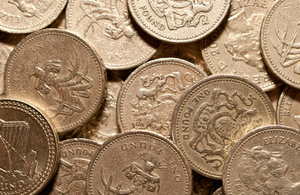Scottish independence: 5 reasons a currency union wouldn't work
Experts warn that a currency union between an independent Scotland and the rest of the UK would be impossible.

More experts are speaking out to warn a currency union between an independent Scotland and the rest of the UK would be impossible.
Recently the British Chambers of Commerce published a survey showing the vast majority of businesses want Scotland to remain part of the UK, and only 35 per cent believe a formal currency union would work.
Meanwhile the National Institute for Economic and Social Research released a report also saying a currency union would not work.
Here are 5 reasons why not.
Get the facts. Visit www.gov.uk/scottishreferendum
1. Size of the economies
The difference in size between the economies of Scotland and the rest of the UK makes it a completely one-sided deal. The economy of the continuing UK would be 10 times the size of the Scottish economy after independence. So while UK’s taxpayers might have to bail out the Scottish Government, the reverse would not be remotely possible.
2. Size of the banking sectors
Because the banking sector is proportionally so much bigger in Scotland than in the rest of the UK, the financial sector risks between Scotland and the rest of the UK are hugely imbalanced. This means that a currency union could only work alongside a banking union, yet there are no workable proposals as to how such a banking union would work.
3. Banking union needs fiscal union
A banking union would not work without a fiscal union. And with a fiscal union an independent Scotland wouldn’t be able to decide for itself how to raise and spend money.
4. No guarantees about the future
Currency unions never work without cast-iron assurances that they are forever. But the Scottish Government white paper on independence says it would “be open to people in Scotland to choose a different arrangement in the future”.
5. Scotland would be out of control
A currency union would mean Scotland couldn’t set its own interest rates, tax and spending levels. Whereas if Scotland was to embark on becoming an independent country it would want all the control it could get over its own future.
Scotland is stronger sharing the pound as part of the United Kingdom. Find out more about how the Scottish referendum could impact money and the economy.
Photo by William Warby